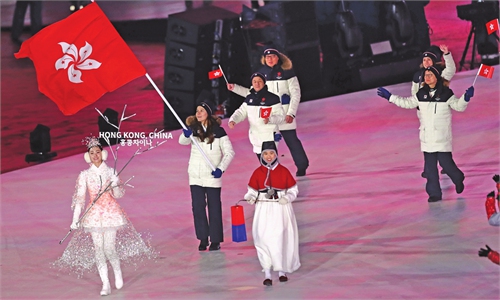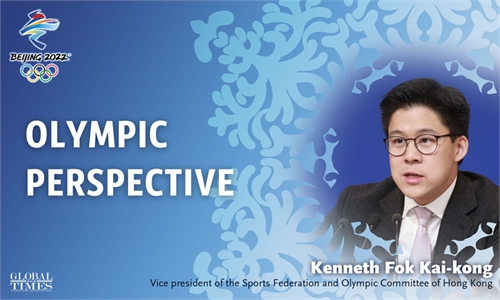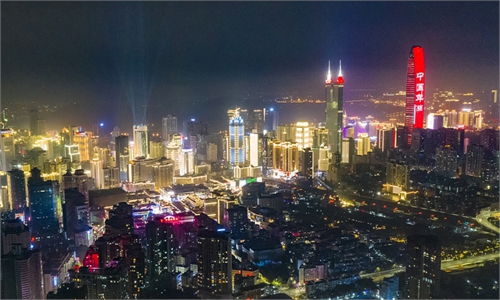Kenneth Fok calls for greater economic, cultural integration between HK and mainland
Kenneth Fok calls for greater economic, cultural integration with mainland

Kenneth Fok Kai-kong (Left) poses with actor Eric Tsang Chi-wai, his father Timothy Fok Tsun-ting and Sidney Chu, Hong Kong's speed skater at the press conference for Winter Olympics on January 4, 2022. Photo: Xinhua
The most important task for the Hong Kong Special Administrative Region (HKSAR) at the moment is to contain the spread of COVID-19 in the city with the strong support of the mainland to protect residents and resume economic and other operations, Kenneth Fok Kai-kong, a member of the National Committee of the Chinese People's Political Consultative Conference (CPPCC), told the Global Times.
In an exclusive interview on the sidelines of the ongoing two sessions in Beijing, Fok, also a business and cultural leader in the HKSAR, called for greater integration between the city and the mainland in economic, cultural and sports sectors through the development of the Guangdong-Hong Kong-Macao Greater Bay Area (GBA).
Amid the current outbreak of COVID-19 in the HKSAR, many deputies of the National People's Congress and members of the CPPCC National Committee have suggested proposals for anti-epidemic efforts, including supporting cross-border ambulance passage, setting up buffer zones for the delivery of vegetables and food at Hong Kong-Shenzhen ports, and stepping up support of medical supplies, facilities and personnel.
Fok said he has been touched by the support from the mainland, but there are still challenges, such as distributing epidemic prevention materials to local residents in a safe and efficient way. "We should all unite and support Hong Kong to fight against the pandemic, especially to protect the lives of elderly people and children," said Fok.
A variety of epidemic prevention materials and life necessities have been transported to the HKSAR from the Chinese mainland non-stop. For instance, 19.47 million rapid antigen detection kits and 39.55 million N95/KN95 masks were delivered to Hong Kong, along with other medical supplies as of 12 am on March 2, people.cn reported on Tuesday.
Meanwhile, 21,660 live pigs, 34,934 tons of vegetables, and 7,298 tons of fruits, along with other necessities, were delivered to Hong Kong from February 16 to March 3.
According to Fok, the HKSAR should reflect on how this round of the pandemic has affected China as a whole, and what epidemic prevention policies the HKSAR can implement in a bid to better cooperate with the national policy and accelerate the resumption of travel between the city and the mainland.
Multiple sectors in Hong Kong as well as normal cultural and sports exchanges have been affected by the pandemic, said Fok, adding that the HKSAR needs to come up with practical plans, while cooperating with responsible authorities in the Chinese mainland in order to promote free travel.
Fok stressed that it is important to ensure the confidence of the international community toward the city, as the HKSAR's international status is still an advantage for China's development under the "one country, two systems" principle.
Paul Chan Mo-po, financial secretary of the HKSAR, said on Sunday that Hong Kong is ensuring the continuous and effective operation of the financial markets amid anti-epidemic work.
Chan noted that many international financial institutions in Hong Kong have put in place contingency plans in response to the outbreak, adding that the financial markets will operate as usual even under tightened measures by cooperating with the HKSAR government's prepared "business continuity plan."
Chan explained that the "business continuity plan" could ensure the continuous normal operations of Hong Kong's financial system, with only about 10-20 percent of the workforce in the office. He said that the banking system handles an average of more than HK$3 trillion ($383.6 billion) of clearing transactions every day on top of many electronic transactions, settlements and international capital flows across the market.
The GBA has also become an important topic among deputies and political advisors from the Hong Kong and Macao SARs during the ongoing two sessions.
Fok noted that the GBA will help the Hong Kong cultural industry to cooperate with the mainland, which will also help better tell the "China story."
He added that the cultural industry in Hong Kong is seeking transformation and upgrading, which was mostly funded by the HKSAR government, and it might be hard to form a cultural ecosystem when the market is limited to Hong Kong.
"Hong Kong only has 7 million people whereas the GBA has a population of more than 70 million. So finding out how to use the economic power of the GBA to further promote the development of Hong Kong's cultural industry will be a significant task," said Fok.
He added that there are still multiple issues and challenges to be further discussed for the Hong Kong cultural industry to further integrate into the mainland.
Going forward, Fok noted that the city's Legislative Council will work with the HKSAR government to roll out policies to bring more benefits to Hong Kong residents.
The safety of Hong Kong residents has been guaranteed after the implementation of the National Security Law and electoral reforms in the city, said Fok.



